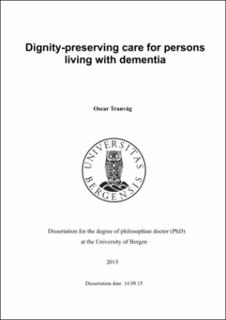| dc.description.abstract | The overall aim of the study was to develop an empirical-theoretical model of dignitypreserving care for persons living with dementia, grounded upon the perceptions of nurses, allied healthcare professionals, and individuals living with dementia. In study 1, we applied Noblit and Hare’s meta-ethnography in order to synthesize 10 qualitative studies originating in four different countries, exploring nurse and allied healthcare professional perception/practice concerning dignity-preserving dementia care. The results showed how “advocating the person’s autonomy and integrity”, involving the caring aspects; having compassion for the person; confirming the person’s worthiness and sense of self, and; creating a humane and purposeful environment, were identified as primary foundations for dignity-preserving dementia care. Moreover, “balancing individual choices among persons no longer able to make sound decisions, against the duty of making choices on behalf of the person”, involving; persuasion; and/or mild restraint, were considered a crucial aspects in certain situations. “Sheltering human worth – remembering those who forget” was identified as an overarching metaphor for the comprehensive motive and core values within dignitypreserving dementia care. In study 2, we interviewed eleven persons living with mild to moderate dementia while exploring their perceptions of personal dimensions crucial for experiencing dignity in their daily lives. Utilizing Gadamer’s hermeneutical methodology, our interpretation revealed three main dimensions. First, a “historical dignity-dimension”, a source of dignity experience when acknowledging one’s personal life-projects and life-history, involving; valuing foundation of life through childhood and upbringing; feeling gratitude and pride in having established a family of one’s own, and; appreciating honorable employment and meaningful work in their past. Second, an “intrapersonal dignity-dimension”, promoting the experience of dignity when recognizing one’s own human worth, and living life according to internal values, involving; acknowledging oneself; living according to personal moral virtue, and; enjoying enriching activities of daily life. Third, an “interpersonal dignity-dimension”, enhancing sense of dignity when experiencing being part of a caring and confirming communion, involving; receiving recognition and respect from others, and; experiencing transcendental and spiritual meaning in daily living. Study 3 investigated crucial qualities of relational interactions preserving dignity experience among people with dementia, while interacting with family, social network and healthcare professionals. The eleven individuals participating in study 2 were also interviewed in order to explore this subject. Gadamer’s hermeneutical methodology was utilized. The study found how the main quality of dignity-preserving interactions within the family was related to “Experiencing love and confirmation”, involving; feeling the love and affection from spouse; spousal support during activities of daily living, and; feeling appreciated and acknowledged as a parent, grandparent and/or great-grandparent. Second, the main quality of dignity-preserving interaction in a social network was related to “Experiencing social inclusion and fellowship”, involving; perceiving friendships stay alive, and; feeling socially included, living an active life within a social fellowship. Finally, the results showed the main quality of dignitypreserving interactions with healthcare professionals. These related to “Experiencing humane warmth and understanding within a caring culture, being met as an equal human being”, involving; feeling respected, listened to and taken seriously; meeting kindliness; receiving health-related information in a gentle manner; adopting positive realism while feeling empowered, and; experiencing similar status and rights as other patient groups. In developing a theoretical understanding of the empirical data collected for this research, Katie Eriksson’s Theory of Caritative caring and her perspectives of dignity-preservation for the suffering human being, served as a helpful framework. The study concludes: Confirming human worth and equality inherent in each person with dementia is the overall foundation for dignity-preserving care. Human worth and equality can be preserved within caring communions that recognize absolute dignity and promote relative dignity for every individual, by supporting personal becoming and enhancing personal meaning through acts of intervening that shelter intrapersonal dignity, acknowledge historical dignity, and uphold interpersonal dignity. On this basis a model of dignity-preserving care is developed, entitled: «Dignity Horizon Model: Caring for persons living with dementia». | en_US |

